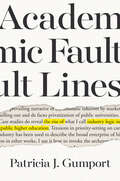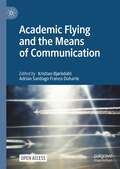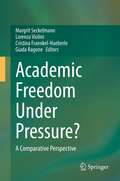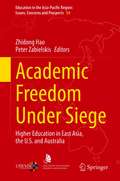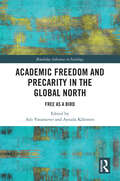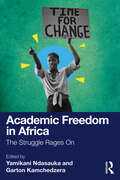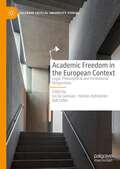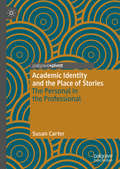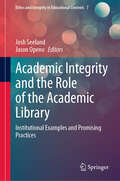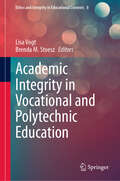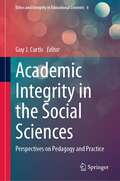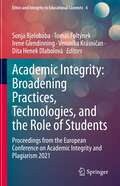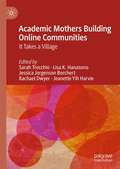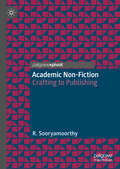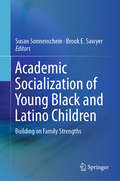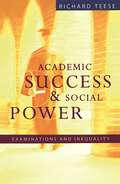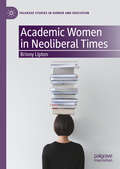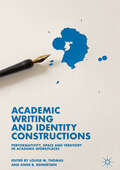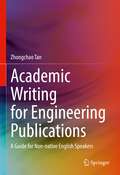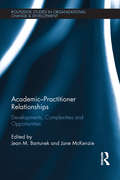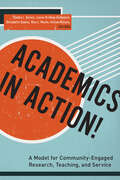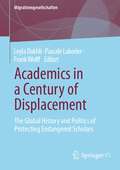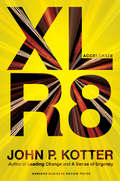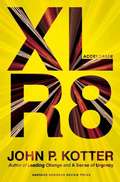- Table View
- List View
Academic Fault Lines: The Rise of Industry Logic in Public Higher Education
by Patricia J. GumportHow did public higher education become an industry? This unprecedented account reveals how campus leaders and faculty preserved the vitality and core values of public higher education despite changing resources and expectations.American public higher education is in crisis. After decades of public scrutiny over affordability, access, and quality, indictments of the institution as a whole abound. Campus leaders and faculty report a loss of public respect resulting from their alleged unresponsiveness to demands for change. But is this loss of confidence warranted? And how did we get to this point? In Academic Fault Lines, Patricia J. Gumport offers a compelling account of the profound shift in societal expectations for what public colleges and universities should be and do. She attributes these new attitudes to the ascendance of "industry logic"—the notion that higher education must prioritize serving the economy. Arguing that industry logic has had far-reaching effects, Gumport shows how this business-oriented mandate has prompted colleges to restructure for efficiency gains, adopt more corporate forms, develop deeper ties with industry, and mold academic programs in the interest of enhancing students' future employment prospects. She also explains how industry logic gained traction and momentum, altering what constitutes legitimacy for public higher education.Yet Gumport's narrative is by no means defeatist. Drawing on case studies of nine public colleges and universities, as well as more than 200 stakeholder interviews, Gumport's nuanced account conveys the successful efforts of leaders and educators to preserve and even strengthen fundamental public values such as educational access, knowledge advancement regardless of currency, and civic responsibility. Ultimately, Academic Fault Lines demonstrates how intrepid faculty and administrators engaged their communities both on and off campus, collaborating and inventing win-win scenarios to further public higher education's expanding legacy of service to all citizens while preserving its centrality to society and the world.
Academic Flying and the Means of Communication
by Kristian Bjørkdahl Adrian Santiago Franco DuharteThis open access book shines a light on how and why academic work became entwined with air travel, and what can be done to change academia’s flying habit. The starting point of the book is that flying is only one means of scholarly communication among many, and that the state of the planet now obliges us to shift to other means. How can the academic-as-globetrotter become a thing of the past? The chapters in this book respond to this call in three steps. It documents the consequences of academic flying, it investigates the issue of why academics fly, and it begins an effort to think through what can replace flying, and how. Finally, it confronts scholars and scientists, students, activists, research funders, university administrators, and others, with a call to translate this research into action.
Academic Freedom Under Pressure?: A Comparative Perspective
by Lorenza Violini Margrit Seckelmann Cristina Fraenkel-Haeberle Giada RagoneIs academic freedom threatened? The book examines current challenges to academic freedom in Europe, focusing mainly on Italy and Germany. The cases discussed demonstrate that research and teaching are under pressure in European democracies: in Hungary and Poland due to political constraints, in other countries due to societal expectations. Considering different interrelated aspects, the four parts of the book explore many real and potential threats to universities, scientific institutions and researchers, ranging from the European dimension of freedom of the arts and sciences to comparative analysis of emerging challenges to academic freedom against the backdrop of the COVID-19 pandemic. They highlight threats to university autonomy from the economic orientation of university governance, which emphasizes efficiency, competition, and external evaluation, and from new rules concerning trigger warnings, speech restrictions, and ethics commissions. Detailed study of these complex threats is intended to stimulate scholarly reflection and elicit serious discussion at European and national level. The volume contributes to the search for a new role of universities and scientific institutions and is addressed to academics and political stakeholders.
Academic Freedom Under Siege: Higher Education in East Asia, the U.S. and Australia (Education in the Asia-Pacific Region: Issues, Concerns and Prospects #54)
by Zhidong Hao Peter ZabielskisThis book argues that academic freedom in higher education in East Asia, the U.S. and Australia is under stress. Academic freedom means freedom to teach, research, and serve in multiple political and social roles based on professional principles. It is closely linked to shared governance, in which academics participate in and influence decision making in core academic concerns such as choosing new faculty, faculty promotion, tenure decisions and the approval of new academic programs.In different countries and regions, the duress confronting academic freedom may come from different directions, and the ability of faculty to share power can vary greatly. In authoritarian mainland China, it is mostly political and ideological controls that greatly affect academic freedom, and shared governance is very much limited. In semi-democracies like Hong Kong and Macau and democracies like Taiwan, Japan, South Korea, the U.S. and Australia, corporatization and commercialization have had great impact on both academic freedom and shared governance. The result is that the roles professors play within academia are continually being diminished and the academic profession is struggling to maintain its ground. Similar developments are also occurring in Europe. These developments should cause great concern to educators, researchers and policymakers everywhere. The authors collected here present attempts to learn from current practice in order to move policy into directions that will help protect higher education as a common good. This book highlights the importance of academic freedom and provides insights into the ways it is being infringed both by commercialization and corporatization on the one hand and political repression on the other. It vividly illustrates detailed case studies and empirical data that make it a compelling read.- Professor Ruth Hayhoe, University of Toronto, Canada Academic freedom is as important today as at any time in the last century. The authors point out the challenges that academic freedom faces on a global scale. The import of the book is in its comparative perspective steeped in data and analysis. Thoughtful. Cogent. Compelling. - Professor William G. Tierney and Professor Wilbur-Kieffer, University of Southern California, United States
Academic Freedom and Precarity in the Global North: Free as a Bird (Routledge Advances in Sociology)
by Aslı Vatansever and Aysuda KölemenWith contributions from six leading scientific countries of the Global North and from the general European Higher Education Area, this book questions the predominant view on academic freedom and pleads for a holistic approach. While academic freedom has been a top agenda point for the global scientific community in recent years, the public and academic discourse has often been marked by a negative interpretation of the term understood merely as exemption from state intervention and censorship. The contributions in this edited volume demonstrate, however, that this is not where the story ends: the ability to exercise academic freedom not only involves the freedom of expression in its abstract sense but should involve the capability to determine research agendas and curricula independently from market pressures or threats of career sabotage, and to resist workplace misconduct without fear of losing future career chances. Providing a differentiated picture of contemporary structural limits to academic freedom in advanced democracies, this volume will be of great interest for not only scholars of higher education, but for the entire academic community.
Academic Freedom in Africa: The Struggle Rages On
by Yamikani Ndasauka Garton KamchedzeraThis book leaves no stone unturned in its comprehensive examination of the complex challenges surrounding academic freedom in Africa.Drawing on diverse perspectives and methodologies, it delves into the historical, philosophical, legal, and socio-political dimensions shaping academic freedom across the continent. The authors grapple with colonial legacies, tensions between Western and African notions of intellectual liberty, government authoritarianism, and institutional constraints that hinder open discourse and the pursuit of knowledge. The book highlights systemic obstacles and promising avenues for progress through case studies, comparative analysis, and empirical research, such as constitutional reforms, scholar activism, and regional networks. This thought-provoking volume offers critical insights into the state of academic freedom in Africa, emphasising the necessity of supporting African voices and agencies in the quest for meaningful intellectual autonomy.Academic Freedom in Africa is an essential read for students, scholars, policymakers, and anyone concerned with the future of higher education and democracy on the continent.
Academic Freedom in the European Context: Legal, Philosophical and Institutional Perspectives (Palgrave Critical University Studies)
by Ralf Lüfter Ivo De Gennaro Hannes HofmeisterThis book explores the concept of academic freedom from a European vantage point. Drawing on both philosophical and legal perspectives, the editors and contributors analyse the concept of academic freedom within the present institutional setting. Academic freedom has long been considered a natural part of higher education, but as the world enters the digital age, a renewed understanding of its role and the threats it must face is required. The authors question the purpose of science without freedom, and subsequently the purpose of political communities without free science. Although the book uses European case studies to answer these questions, it undoubtedly has global relevance: what would be left of the present notion of the ‘global world’ were we to conceive of its character without modern science? This book calls for a critical re-examination of the academic community and its own understanding of the sources, conditions and aims of scientific practice.
Academic Identity and the Place of Stories: The Personal in the Professional
by Susan CarterThis book explores academic identity development in the 21st century university. Recognising dramatic shifts in academic practices and landscapes, the book pushes back on rising neoliberalism with a person-focused, culturally aware pathway for career development. Stories of the author’s own experiences intersect a solid grounding in educational literature, encouraging scholars to take an active role in considering their own academic identity. In doing so, this volume suggests that academics look inward at what matters to them – rather than being overwhelmed by academia – in order to shape identities and career trajectories that are dynamic and satisfying.
Academic Integrity and the Role of the Academic Library: Institutional Examples and Promising Practices (Ethics and Integrity in Educational Contexts #7)
by Jason Openo Josh SeelandThis book presents the growing interconnection of two pillars from the world’s higher education institutions: academic integrity and libraries. It provides sound examples to extant questions and conversations about whose job it is to teach academic integrity, and what library work is. The role of libraries in supporting academic integrity is not always clear and has not been fully explored. Drawing from library literature and that of academic integrity more broadly, readers are exposed to how libraries are necessary in a holistic approach to academic integrity. Education about academic integrity and the prevention of academic misconduct, for not only students but other institutional stakeholders, are demonstrated as occurring optimally in positive, supportive, and proactive ways. The book details numerous ways in which librarians can work with faculty and other stakeholders using established frameworks such as information literacy and blended librarianship as well as innovative platforms and content. Other contributions involve the identification of potential academic misconduct and administration of academic integrity policies to complete the cycle recommended by the frameworks of global educational quality organizations (QAA, TEQSA). Initiatives presented in the book include those at the course level and institution-wide initiatives involving curriculum, policy, and supports for faculty and students. Also contained are efforts occurring at a national level within professional networks , in addition to international library curriculum. This book provides inspiration to institutions and academic libraries of any size and scope to embrace this emerging role in creating cultures of academic integrity.
Academic Integrity in Vocational and Polytechnic Education (Ethics and Integrity in Educational Contexts #8)
by Brenda M. Stoesz Lisa VogtAcademic Integrity in Vocational and Polytechnic Education addresses educative approaches to support academic integrity in hands-on and applied learning environments with a focus on practitioner experiences. Building on systems theory, the book documents multi-stakeholder perspectives of institutional leaders, department specialists, and individual champions of academic integrity. Readers will be introduced to the 4M framework, which views academic integrity as a responsibility at all levels of the institution and connects to the broader community and professional industries. Each chapter is set in an applied context and lends to the philosophy of a shared responsibility in growing the institutional culture of academic integrity. This book offers insights from the perspectives of leaders, faculty, and support staff, as authors describe challenges and solutions to upholding academic integrity in short term programming geared toward employment readiness. Although the work is about vocational and polytechnic education written by members of this community, it has a wider appeal across higher education due to shifting pedagogical methods that are becoming more applied and personalized. In an age of information ubiquity, where traditional learning activities such as rote memorization and essay writing do not sufficiently assess learning or prepare the learner for the workplace, educators will find unique insights from the vocational and polytechnic sector to supporting academic integrity in a changing academic landscape.
Academic Integrity in the Social Sciences: Perspectives on Pedagogy and Practice (Ethics and Integrity in Educational Contexts #6)
by Guy J. CurtisThis international book provides a series of viewpoints on academic integrity from the perspective of social sciences. It brings together multiple aspects of academic integrity, but with the consistent theme of being at a level of analysis that considers people and their place in the world. It covers topics such as how academic integrity can be taught, and why academic integrity breaches occur. This book informs the work of researchers, educators, and practitioners as we go forward in understanding academic integrity and addressing academic misconduct. The social sciences include academic disciplines such as sociology, economics, psychology, education, anthropology, political science, and criminology. Researchers and theorists in these fields offer a range of unique and valuable perspectives on academic integrity with questions ranging from: “Why do students cheat and how best do we teach them not to?” to “What are the societal and political implications of academic cheating?”
Academic Integrity: Proceedings from the European Conference on Academic Integrity and Plagiarism 2021 (Ethics and Integrity in Educational Contexts #4)
by Sonja Bjelobaba Tomáš Foltýnek Irene Glendinning Veronika Krásničan Dita Henek DlabolováThis book aims to broaden the horizons of academic integrity by discussing novel practices and technologies, and the importance of student involvement in building a culture of academic integrity. Examples are the outreach efforts towards a range of non-educational organisations, the exploration and comparison of ethical policies and actions in different institutions, and the improvement of student responses in research on sensitive topics. It explores a range of scenarios and strategies adopted in different parts of the world during the COVID-19 pandemic, and addresses new technological advances for investigating types of academic misconduct that are difficult to find, including translation plagiarism, contract cheating, the usage of the proctoring systems, and the innovative use of data mining to detect cheating on on-line quizzes. The work shows how working with students is an essential part of the fight against academic misconduct. The student voice can be a powerful source of motivation for students, but educators also need to understand their perspectives, especially regarding such an important topic as academic integrity.
Academic Mothers Building Online Communities: It Takes a Village
by Rachael Dwyer Sarah Trocchio Lisa K. Hanasono Jessica Jorgenson Borchert Jeanette Yih HarvieThis volume focuses on the diverse ways in which mothers working within academia seek to find others with similar experiences to build virtual communities. Although the faculty and student populations of universities have diversified, mothers in academia are disproportionately overrepresented in precarious faculty and staff positions and continue to experience myriad institutional and interpersonal barriers, such as gender wage gaps that are exacerbated by stop-the-clock tenure policies, inadequate parental leave policies, expensive or scarce local childcare options, and social biases. The book gives space to the many ways women create and challenge their own versions of motherhood through a digital “village,” examining how academic mothers use virtual communities to seek and enact different kinds of support.
Academic Non-Fiction: Crafting to Publishing
by R. SooryamoorthyThis book offers comprehensive directions to crafting academic nonfiction that is both rigorous and captivating, filling a critical gap in the genre. While academic nonfiction plays a vital role in fostering knowledge-based societies and driving economic growth, there has long been a need for a resource that helps authors create works that are as engaging as they are informative. Designed for both aspiring and established writers, this book provides practical advice and innovative techniques to elevate nonfiction writing. It covers everything from selecting marketable topics and developing effective writing habits to managing time and navigating the complexities of the publication process. Unlike most writing guides, it emphasises how to infuse nonfiction with the allure and engagement necessary to reach a broad audience without compromising accuracy or depth. With short, digestible chapters, insider tips on proposal writing, and insights into the peer review process, this book serves as a step-by-step roadmap to transforming academic writing into compelling works. Essential for writers aiming to produce nonfiction that not only informs but also resonates with readers, this resource is an indispensable tool for creating impactful scholarly work.
Academic Socialization of Young Black and Latino Children: Building on Family Strengths
by Susan Sonnenschein Brook E. SawyerThis book offers a strengths-based, family-focused approach to improving the educational performance and school experience of struggling Black and Latino students. The book discusses educational challenges faced by low-income families of color and the different strengths within Black and Latino family life that can affect these challenges. It focuses building on these strengths within the children’s home environments that can serve as a foundation for subsequent learning. The chapters describe a wide range of family practices and beliefs, including development of interventions to support families that promote early language and literacy, early mathematics, and social skills. The chapters also present quantitative and/or qualitative studies using a strengths-based approach to parents’ socialization of their children’s early academic skills.
Academic Success And Social Power: Examinations and Inequality
by Richard TeeseA most significant text that says something new about how student achievement is shaped. Richard Teese cuts across much of the recent talk about reform and allows us to think about the issues afresh. His findings will fascinate all. Professor Simon Marginson, Monash University This eye-opening study of Australian secondary education looks beyond clich�s about 'excellence' to analyse the historically specific nature of the scholarly ideal against which successive generations of Australian students have been judged. Drawing on a wealth of strikingly original research, Richard Teese offers a penetrating analysis of Victorian secondary schooling in the half-century after World War Two. This was a era in which higher secondary schooling ceased to be the preserve of an elite and emerged as a system of mass education. It was also a period marked by successive waves of reform in curriculum and assessment. Yet, at the end of it all, Australians have been left with a sharply polarised system of schooling in which the most economically vulnerable populations of young people are also those most at risk of educational failure. This book asks the hard questions. Are our systems of secondary teaching -- and the expectations they place on students -- anachronistic in an age of mass education? How far is the curriculum itself responsible for the manifest disparities in achievement between sectors and regions, and between boys and girls? What has been the universities' role in the process of reform and counter-reform? And what have all these upheavals implied for the practice of teaching?
Academic Women in Neoliberal Times (Palgrave Studies in Gender and Education)
by Briony LiptonThis book investigates the gendered dimensions of academic life in the contemporary Australian university. It examines key discourses – most notably academic performativity and identity – through a feminist lens, and scrutinises how discourses of neoliberalism and feminism are entangled in the structure, systems, operations and cultures of the university. Drawing on in-depth qualitative interviews with academic women in Australia, the author uses a mix of experimental methods to emphasise the performative and discursive decisions women make with regard to their academic careers. In doing so, this book reveals how women themselves generate neoliberal and feminist shifts, how they manage the contradictions they produce, and how they carve spaces of influence and authority. Moving towards a re-evaluation of existing discourses, this book offers new insights into gender inequality in the Australian university in neoliberal times.
Academic Writing and Identity Constructions: Performativity, Space And Territory In Academic Workplaces
by Louise M. Thomas Anne B. ReinertsenThis book presents multiple cultural and contextual takes on working performances of academic/writer/thinker, both inside and outside the academy. With worldwide, seismic shifts taking place in both the contexts and terrains of universities, and subsequently the altering of what it means to write as an academic and work in academia, the editors and contributors use writing to position and re-position themselves as academics, thinkers and researchers. Using as a point of departure universities and academic/writing work contexts shaped by the increasing dominance of commodification, measurement and performativity, this volume explores responses to these evolving, shifting contexts. In response to the growing global interest in writing as performance, this book breaks new ground by theorizing multiple identity constructions of academic/writer/researcher; considering the possibilities and challenges of engaging in academic writing work in ways that are authentic and sustainable. This reflective and interdisciplinary volume will resonate with students and scholars of academic writing, as well as all those working to reconcile different facets of identity.
Academic Writing for Engineering Publications: A Guide for Non-native English Speakers
by Zhongchao TanThis textbook is designed for non-native English speakers who need to write scientific and engineering research articles, technical reports, engineering thesis, academic books, and other technical documents in English. The author focuses on formal academic writing in a professional language and frame. The book is written in standard English and provides useful guidelines on development of thoughts, organization of ideas, construction of paragraphs and sentences, and choices of precise words. It also pays attention to details such as visual creation, punctuation, and format. Informal writing is excluded from the scope of this practical guideline.
Academic-Practitioner Relationships: Developments, Complexities and Opportunities (Routledge Studies in Organizational Change & Development)
by Jean M. Bartunek and Jane McKenzieWhile executives are keen to harness organizational knowledge and improve business performance, the topic of how academics can produce rigorous and relevant theory in working relationships with practitioners is a much contested topic. Many aspects of this knowledge co-creation can create tensions, and the ways in which research is conducted and published can affect practitioner acceptance, as well as its consequent uptake and use in different contexts. Expertly compiled by Jean Bartunek and Jane McKenzie, with contributions from global thinkers in the field, this book offers a concise and up-to-date review of the essential analysis and action underlying scholarly engagement with the world of business. It discusses the sorts of capabilities academics need to collaborate effectively with practitioners and illustrates good practice through international case studies drawn from acknowledged centres of excellence. These show how to negotiate different constituencies with different priorities, values, and practices to work together to produce research of rigor and relevance. It will be a key reference and resource for all researchers who are engaged with practitioners, and an invaluable tool for training academics to develop research with impact.
Academics in Action!: A Model for Community-Engaged Research, Teaching, and Service
by Lauren Brinkley-Rubinstein Bernadette Doykos Nina C. Martin Allison McGuireThe academy is often described as an ivory tower, isolated from the community surrounding it. Presenting the theory, vision, and implementation of a socially engaged program for the Department of Human and Organizational Development (HOD) in Peabody’s College of Education and Human Development at Vanderbilt University, Academics in Action! describes a more integrated model wherein students and faculty work with communities, learn from them, and bring to bear findings from theory and research to generate solutions to community problems.Offering examples of community-engaged theory, scholarship, teaching, and action, Academics in Action! describes the nuanced structures that foster and support their development within a research university. Theory and action span multiple ecological levels from individuals and small groups to organizations and social structures. The communities of engagement range from local neighborhoods and schools to arenas of national policy and international development.Reflecting the unique perspectives of research faculty, practitioners, and graduate students, Academics in Action! documents a specific philosophy of education that fosters and supports engagement; the potentially transformative nature of academic work for students, faculty, and the broader society; and some of the implications and challenges of action-oriented efforts in light of dynamics such as income inequality, racism, and global capitalism. This edited volume chronicles teaching, research, and community action that influences both inside and outside the classroom as well as presents dimensions of a participatory model that set such efforts into action.
Academics in a Century of Displacement: The Global History and Politics of Protecting Endangered Scholars (Migrationsgesellschaften)
by Frank Wolff Leyla Dakhli Pascale Laborier‘Endangered scholars’ is a recently highly relevant, yet historical notion. Embedded in the greater history of the 20th and 21st centuries, it captures the phenomenon of scholars who, after years of intellectual work and integration in their societies of origin, are forced to seek rescue in foreign host societies. The pressing urgency of the topic thus has an important historical background. From escaping Russian intellectuals after 1917 to the protection of Jewish refugees during World War II, Algerian intellectuals in contemporary history, or persecuted academics from Turkey today: Over the course of about a century, categories of inclusion, transnational relations, and forms of agency of scholars at risk remained surprisingly stable (and hence diachronously and synchronously comparable) while they also adjusted flexibly to contemporary conditions. This collective volume carves out this historical development and its recent expressions. It brings together researchers in a vivid yet largely unconnected field of migration and refugee studies. By developing a complex image of the origin of the global history and politics of protecting endangered scholars from the early 20th century until today, the book contributes to research on academics in exile as a part of refugee research, migration studies, the history of higher education, and the contemporary history of societies. The interdisciplinary volume explores the phenomenon as a historical, political and legal subject, brings together scholars of forced migration and intellectual studies, and includes currently affected scholars into those reflections.
Accelerate
by John P. KotterBased on the award-winning article in Harvard Business Review, from global leadership expert John Kotter.It's a familiar scene in organizations today: a new competitive threat or a big opportunity emerges. You quickly create a strategic initiative in response and appoint your best people to make change happen. And it does-but not fast enough. Or effectively enough. Real value gets lost and, ultimately, things drift back to the default status.Why is this scenario so frequently repeated in industries and organizations across the world? In the groundbreaking new book Accelerate (XLR8), leadership and change management expert, and best-selling author, John Kotter provides a fascinating answer-and a powerful new framework for competing and winning in a world of constant turbulence and disruption.Kotter explains how traditional organizational hierarchies evolved to meet the daily demands of running an enterprise. For most companies, the hierarchy is the singular operating system at the heart of the firm. But the reality is, this system simply is not built for an environment where change has become the norm. Kotter advocates a new system-a second, more agile, network-like structure that operates in concert with the hierarchy to create what he calls a "dual operating system"-one that allows companies to capitalize on rapid-fire strategic challenges and still make their numbers.Accelerate (XLR8) vividly illustrates the five core principles underlying the new network system, the eight Accelerators that drive it, and how leaders must create urgency in others through role modeling. And perhaps most crucial, the book reveals how the best companies focus and align their people's energy and urgency around what Kotter calls the big opportunity.If you're a pioneer, a leader who knows that bold change is necessary to survive and thrive in an ever-changing world, this book will help you accelerate into a better, more profitable future.
Accelerate
by John P. KotterBased on the award-winning article in Harvard Business Review, from global leadership expert John Kotter.It's a familiar scene in organizations today: a new competitive threat or a big opportunity emerges. You quickly create a strategic initiative in response and appoint your best people to make change happen. And it does-but not fast enough. Or effectively enough. Real value gets lost and, ultimately, things drift back to the default status.Why is this scenario so frequently repeated in industries and organizations across the world? In the groundbreaking new book Accelerate (XLR8), leadership and change management expert, and best-selling author, John Kotter provides a fascinating answer-and a powerful new framework for competing and winning in a world of constant turbulence and disruption.Kotter explains how traditional organizational hierarchies evolved to meet the daily demands of running an enterprise. For most companies, the hierarchy is the singular operating system at the heart of the firm. But the reality is, this system simply is not built for an environment where change has become the norm. Kotter advocates a new system-a second, more agile, network-like structure that operates in concert with the hierarchy to create what he calls a "dual operating system"-one that allows companies to capitalize on rapid-fire strategic challenges and still make their numbers.Accelerate (XLR8) vividly illustrates the five core principles underlying the new network system, the eight Accelerators that drive it, and how leaders must create urgency in others through role modeling. And perhaps most crucial, the book reveals how the best companies focus and align their people's energy and urgency around what Kotter calls the big opportunity.If you're a pioneer, a leader who knows that bold change is necessary to survive and thrive in an ever-changing world, this book will help you accelerate into a better, more profitable future.
